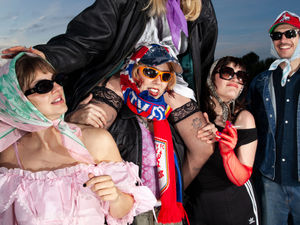Shropshire rescue centre blasts 'disgraceful’ rise in abandoned animals
A business owner who takes in unwanted animals is calling on the government to tackle the ‘disgraceful’ number of animals being thrown out by UK families.
Zoologist David Riley, who owns Zoosbury, which was based in Shrewsbury before moving to the British Ironworks Centre, believes the number of people throwing away pets is increasing, as animals have become a ‘commodity’ to people.
His business takes in unwanted and abandoned animals every week, which they then offer a home for life. However, he said only a certain amount of animals and pets can be offered a new home, as the number of abandoned pets is constantly rising.
He said: “As a child I was told that ‘we are nation of animal lovers’ and I believed that.
“There was never any thought of giving up an animal if we lost interest or couldn’t be bothered with it and I’m sure it wouldn’t have been allowed unless there was no other option. We now sadly live in this ‘throw-away society’ for most things, but even more so, for animals.
“We hear about many animals like cats and dogs being abandoned and being unwanted but how often do we hear about the large numbers of other animals, from rabbits and guinea pigs, to snakes and lizards, from tarantulas to turtles and tortoises and birds, as just a few examples of those that often become abandoned or simply unwanted?
“We take in many unwanted or abandoned animals every week, which we offer a home to for life. But sadly we can only offer a certain number this second chance in life and these numbers are rising all the time that require our help.
“The big problems we see regularly are firstly the ease with which anyone can buy pets these days and not just from pet shops but from people who over breed these animals in their own homes and who often sell over social media and the internet.
“I often hear the horror stories of what people have been told and it is frustrating and heartbreaking as well.”
Mr Riley believes the problems are with individual breeders passing around animals without a care for the actual animal.
He wants the number of breeders reduced to tackle the problem.
He said: “Breeding is not the romantic thing most people imagine, nothing could be further from the truth, it is stressful for both parties involved and can be very traumatic.
“Many animals are cross bred or bred for their colours with no knowledge of if the animals are related to each other or if they will suffer on going health issues, both mentally or physically.
“Animals have sadly become a commodity to many people which are bred, bought and sold with no thinking that these are living, breathing creatures with feelings, emotions and needs.
“When supply and demand comes into play with animals, those who are already in need of good homes, become less likely to be rehomed and the chance of all these new, young animals finding homes becomes slimmer and slimmer.
“Reducing the breeding of common species of animals of all kinds is the right and ethical thing to do. It is unlikely that any, common species will become endangered if we act more responsibly as animal owners and hopefully, animal lovers.”
Figures back in 2015 showed that 50,000 dogs were being dumped on average each year.
Mr Riley now wants the problem tackled and is calling on government intervention to make that happen.
He added: “We as an animal welfare and education company are calling upon the Government to make animal ownership more of a responsibility where people are required to act in a more a responsible and ethical way.
“We encourage everyone to visit animal rescue centres before rushing out and buying any animals and offer homes to those who are in need of them which are housed there. By doing so we reduce the supply and demand.
“We also say, please do lots of research about the pet you would like to own.”
“The biggest thing we advise though is not directly buying pets for children, instead they should be a family pet.”
Pets do tech children a lot of valuable things, but often suffer when the child either gets board of the pet or looses interest in their pet altogether. If the family all take part in the animal’s care and welfare, it is unlikely the pet will get forgotten about.”
For more information on Zoosbury go to ‘Zoosbury animal education centre’ on Facebook page or email zoosburyeducationcentre@hotmail.com.





